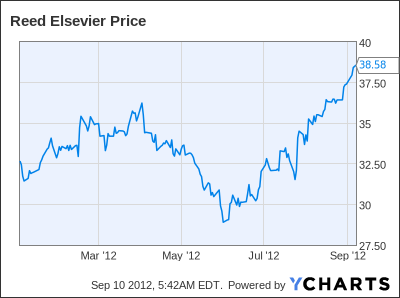Moves to make publicly-funded research available for free online could be disastrous for academic publisher Reed Elsevier and its shareholders, investors have been warned.
In July, three UK education research councils and the European Commission announced stipulations that future research partly funded by taxpayers – much of which is currently published through subscription journals – must be made more open-access. The UK government has labelled research “paywalls” “deeply unhealthy”, and wants to free up availability.
Berstein Research‘s Claudio Aspesi writes in a research note:
“It could drive the profitability of the journal business of Elsevier down by as much as 60%…
“Elsevier journal revenues would be under significant threat because the article processing charges it would earn for many of its publications are unlikely to prove anywhere near what the company needs to be revenue neutral…
“We think the risk posed to the Elsevier business model is substantial. We believe investors are underestimating the disruption that both the EC and even the UK policies could pose to the business model of Elsevier…
“A collapse of the profitability of Elsevier would be catastrophic for Reed Elsevier.”
Reed Elsevier’s share price has gone on rising through the recent announcements due to healthy recent results…

Open-access models may be largely confined to the UK unless Europe forces member states to adopt similar policies. But, with the U.S. also planning similar moves, the publishers will need to adapt.
In May, science minister David Willets told journal publishers gathered at a Publishers Association conference:
“I realise this move to open access presents a challenge and opportunity for your industry, as you have historically received funding by charging for access to a publication,” Willetts told publishers.
“Nevertheless, that funding model is surely going to have to change … To try to preserve the old model is the wrong battle to fight. Look at how the music industry lost out by trying to criminalise a generation of young people for file sharing.”
Many researchers were already revolting against health and science journal publisher Reed Elsevier for selling bundles of journals containing their work, rather than individual journals, to libraries. Tens of thousands of people signed a petition.
Alongside Elsevier in the Reed Elsevier stable is Variety publisher RBI. Bernstein thinks Reed Elesvier, which aborted a planned RBI disposal during the worst of the downturn, should break itself up but that it is more likely to retain an RBI that continues to down-size itself.
![]()